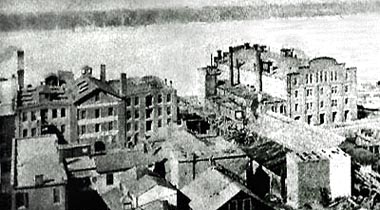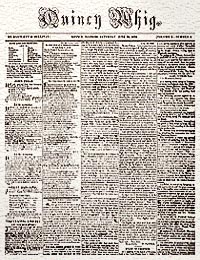
READINGS IN EARLY MORMON HISTORY
(Newspapers of Illinois & Indiana)
Adams County, Illinois
Quincy Whig, Argus, &c.
1841 Articles

Mills along the Quincy waterfront, on the Mississippi, (old photo)
1838 | 1839 | 1840 | 1841 | 1842 | 1843
1844 | 1845 | 1846 | 1847-9 | 1850-69 | post 1869
|
Whig Jan 30 | Whig Mar 06 | Whig Apr 24 Whig May 15 | Whig May 29 | Arg Jun 05 Whig Jun 12 | Whig Jun 26 | Whig Jul 03 Whig Jul 24 | Whig Sep 04 | Whig Sep 18 |

|
Peoria Register | Sangamo Journal | Misc. Ill. papers
Alton Telegraph | Warsaw Signal | Nauvoo Wasp, etc.
Return to: Old Newspapers Articles Index
 By S. M. Bartlett.] Quincy, Illinois, Sat., Jan. 30, 1841. [Vol. 3 - No. 40.
THE MORMONS. -- While Col. Benton, in the Senate of the U. States, is endeavoring to procure an appropriation to pay the troops who served against the Mormons in Missouri, two individuals of that persecuted people have petitioned the House for relief from the outrages committed upon them, and the Mormons generally, by these same troops. The memorial of the Mormons alluded to -- Messrs, Elias Higbee and Rob't. B. Thompson -- states that "they have purchased lands of the general government, lying in the State of Missouri, from which they have been driven with force by the constituted authorities of that State, and prevented from occupying the same." -- (embracing details of the measures employed by the State for that purpose) -- "for which they pray Congress to provide a remedy." -- That petition was laid before the House on the 21st of December, referred to the committee on the Judiciary, and a copy of this document from our Representative -- and it gives authentic details of the transaction to which it refers, is a document of more than general interest. -- Sang. Jour. |
 By S. M. Bartlett.] Quincy, Illinois, Sat., March 6, 1841. [Vol. 2 - No. 45.
|
 By S. M. Bartlett.] Quincy, Illinois, Sat., April 24, 1841. [Vol. 3 - No. 52. Proceedings at Nauvoo. The ceremony of laying the cornerstone of the Temple at Nauvoo, passed off yesterday (6th) with great parade. The number assembled is variously estimated; we should think, however, about 7000 or 8000, some say as high as 12,000. The Nauvoo Legion consisting of 659 men, was in attendance, and considering the short time they have had to prepare, made a very respectable appearance. Mr. Rigdon officiated at the laying of the chief corner stone, and addressed the assembly on a very energetic manner in a speech of about an hour's length. On the whole the exercises passed off with the utmost order, without accident or the slightest disturbance. Gen. Bennet commanded the Legion, under the direction of the Prophet, and acquitted himself in a truly officer-like manner. -- We have no time for further comment this week. -- Warsaw World, April 7. |
 By S. M. Bartlett.] Quincy, Illinois, Sat., May 15, 1841. [Vol. 4 - No. 3. The New Judiciary System -- Rewards. At the late sitting of the Circuit Court in this place, Judge Douglass appointed Calvin A. Warren, Esq. of this city -- a zealous and somewhat ambitious member of the locofoco party -- Master in Chancery, for this county. |
 By S. M. Bartlett.] Quincy, Illinois, Sat., May 29, 1841. [Vol. 4 - No. 5.
==> The appointment of General Bennett, as Master in Chancery for Hancock county, does not meet with the approbation of all the citizens of that county. The last Warsaw Signal says the appointment of Bennett "is frowned on with indignity by nine-tenths of the substantial sitizens of the county." The same paper has the following paragraph in relation to the Mormons: |
 Vol. 6. Quincy, Illinois, Sat., June 5, 1841. No. 39. THE MORMONS. An officer of one of the steamboats that lately arrived at our warf from above, informs us that the Governor of Illinois has, bona-fide, become a Mormon. |
 By S. M. Bartlett.] Quincy, Illinois, Sat., June 12, 1841. [Vol. 4 - No. 7.
Arrest of Joseph Smith, the Mormon Prophet -- We have another farce to record in which some of the officials of this state are prominent actors. It will be recollected, that last summer, the Missouri authorities made a demand upon Gov. Carlin for the persons of Joseph Smith, Sydney Rigdon, and, we believe, some other individuals of the Mormon faith. In obedience to the demand, the Governor issued a writ for the arrest of the persons named. This writ was placed in the hands of the sheriff of Hancock county,; after due time had elapsed, the writ was returned to the Governor, with the endorsement, that none of the persons named in it were to be found in Hancock county. Thus matters rested until a few days ago. -- Last week, Joseph Smith, Gen. Bennet and Hyrum Smith came down to the city on business. While here, Joseph Smith called upon the Governor. His Excellency received him politely but coolly, and in a few hours after, gave the old writ -- the same that had been returned, and was lying in the Executive's office -- to the Sheriff, for the purpose of arresting Smith. During this time, S. and his companions had started for home. The sheriff's deputies followed in pursuit and overtook them, we believe at Lima, or near there, in this county, and arrested Smith, and brought him back to the city. Upon the arrival of the Monsoon, Saturday afternoon, Judge Douglass being a passenger, was applied to for a writ of habeas corpus, for the purpose of trying the validity of the Governor's writ under which S. was arrested. The writ was granted by the Judge, and a hearing was to have been had before him in Warren county this week, where he holds court. |
 By S. M. Bartlett.] Quincy, Illinois, Sat., June 26, 1841. [Vol. 4 - No. 9.
|
 By S. M. Bartlett.] Quincy, Illinois, Sat., July 3, 1841. [Vol. 4 - No. 10.
--> The St. Louis Republican states that the Governor of Illinois has become, bona fide, a Mormon. The conversion was effected by a beautiful girl. Who can blame him? -- N. Y. Atlas. |
 By S. M. Bartlett.] Quincy, Illinois, Sat., July 24, 1841. [Vol. 4 - No. 13. Senator Ralston in Galena. We learn by the Galena Gazette, that Senator Ralston took the people by surprise, when he made his appearance among them a few days ago as a candidate for Congress. It appeared to be a matter of dispute with some of the people, as to who the gentleman was, and where he hailed from. One stoutly maintaining that he was a Mormon preacher, and another that he was a recruiting officer, drumming up volunteers to take the "Tonga Islands." or something else. |
 By S. M. Bartlett.] Quincy, Illinois, Sat., Sept. 4, 1841. [Vol. 4 - No. 19.
DEATH OF DON CARLOS SMITH. -- Thro' some mischance we have failed to notice the death of Don C. Smith, one of the publishers of the "Times and Seasons," a Mormon publication issued at Nauvoo. He died in that city on the 7th August, in the 24th year of his age, He was universally respected by the people of that faith, and was a younger brother of the Prophet, Joseph Smith. |
 By S. M. Bartlett.] Quincy, Illinois, Sat., Sept. 18, 1841. [Vol. 4 - No. 21.
R. B. THOMPSON, another of the citizens of the "Times and Seasons," died at Nauvoo, on the 27th utl. He was highly esteamed as a man, and for the sincerity and candor with which he advocated and defended the religion of the "Latter Day Saints." The Nauvoo paper is now inder the entire control of Ebenezer Robinson, one of the original proprietors.
From the N. Y. Atlas.
|
Back to top of this page.
Articles Home Page | Articles Index | History Vault
Oliver's Bookshelf | Spalding Library | Mormon Classics
last updated: Jan. 1, 2006